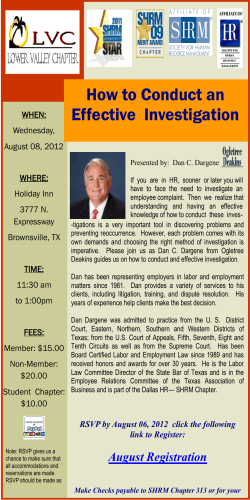
Eventide Asset Management, LLC 60 State Street, Ste. 700 Boston, MA 02109 877-771-EVEN (3836) W W W. E V E N T I D E F U N D S . CO M APRIL 30, 2015 The $70,000 Minimum Wage — Capitalism Gone Bad … or Good? FAITH & BUSINESS TIM WEINHOLD Tim Weinhold serves as Director of Eventide's Faith & Business Initiative, and has served in a faith and business/investing thought leadership capacity with Eventide since its founding. Since relocating from Boston to Seattle a few years ago, Tim has served on the Executive Advisory Council of the School of Business and Economics at Seattle Pacific University, and on the Executive Committee of the school's Center for Integrity in Business. Dan Price, the young CEO of Gravity Payments in Seattle, recently generated a boatload of publicity — and controversy — by committing to pay every one of his 120 employees at least $70,000 per year. Dan said he was concerned that some of his lower-paid employees were struggling to make ends meet. As well, he was concerned about our country’s continuing rise in economic inequality and the spiraling CEO compensation he believes is a big part of the problem. To fund the raises, which will benefit more than half of the company’s workers, Dan cut his own salary from $1,000,000 to $70,000, and decided the company could afford to take a 50 percent reduction in profits. Plenty of people thought this was terrific, including more than a few CEOs. In the week after the story first broke Dan got emails from nearly 100 CEOs lauding his decision. But not everyone was so enthusiastic. The New York Times ran a followup piece detailing some of the criticism directed toward Dan and his decision. These criticisms, by purported defenders of free-market capitalism, evidence egregiously flawed thinking about both capitalism and free markets. As well, they are at direct odds with the wisdom of Scripture. Because these misunderstandings deeply distort the public discussion about business and, too often, the behavior of business people, Christians included, it’s important to address them directly. Perhaps the most prominent critic, according to the New York Times, was Rush Limbaugh, who lambasted Dan’s decision as “pure, unadulterated socialism, which has never worked.” He added, “That’s why I hope this company is a case study in M.B.A. programs on how socialism does not work, because it’s going to fail.” This is nonsensical on its face. Gravity Payments sells its payment processing services to other businesses — at a very nice profit. The company has every intention of continuing to do so. In fact, as a result of the recent publicity, several new clients have signed on. Dan Price and Gravity Payments are practicing simple, straightforward, for-profit capitalism, not socialism. Limbaugh’s unspoken premise, however, is that it is a gross violation of (his view of) capitalist principles to pay people any more than the lowest price at which the market would allow one to hire appropriate workers. He is hardly alone. Diana Furchtgott-Roth, an economist at the conservative Manhattan Institute for Policy Research, said that if Gravity is paying above-market wages, then Mr. Price “is running it more as a charitable organization, because he could get people for less.” Clearly this ‘pay workers as little as possible’ version of capitalism has more than a few partisans, and not just among pundits and academics. Walmart, to pick a prominent example, certainly shares the same conviction. But leaders at many of the most successful companies reject that approach as foolish and shortsighted. Costco, for example, pays its people nearly triple the Eventide | Faith & Business Blog Tim Weinhold on the $70,000 Minimum Wage 2 ‘Good-jobs’ companies consistently compensation at Walmart, including hefty profit-sharing bonuses. But instead of struggling to compete because of that higher cost structure, Costco dramatically outperforms Walmart in virtually every bottom-line category of business performance: outperform their • Costco turns its inventory 50% faster than Walmart, and compared with W almartowned Sam’ s Club, enjoys 70% higher sales/square foot and double the level of sales per employee. competitors. And not • Walmart’s revenue growth rate for the past year was 3.2%, and for the past 10 years was 8.5%. Costco’s comparison numbers are 7.1% and 9.9%. by a little. • Over the past decade, Walmart’s share price is up by less than 100%, while Costco’s share price has more than tripled. As with Gravity Payments, Limbaugh likely believes Costco’s compensation equates to socialism. Furchtgott-Ross presumably thinks the company is being run along the lines of a charity. Those not suffering from self-induced ideological blindness, however, look at the company’s results and draw the obvious conclusion — that Costco is practicing an entirely superior, and entirely admirable, version of capitalism. But even compelling real world results like Costco’s can have a hard time cutting through some people’s ideological fog. Patrick R. Rogers, an associate professor of strategic management at the School of Business and Economics at North Carolina A&T State University, weighed in this way: “The sad thing is that Mr. Price probably thinks happy workers are productive workers. However, there’s just no evidence that this is true. So he’ll improve happiness, only in the short term, and will not improve productivity. Which doesn’t bode well for his long-term viability as a firm.” During an interview with Dan Price on MSNBC, Sam Stein, an editor at The Huffington Post, was considerably more direct: “Are you crazy?” he asked. Yet Costco’s experience is hardly an aberration. Zeynep Ton, one of the country’s leading retail operations experts, and a faculty member at MIT’s Sloane School, researched the performance of low- cost retailers offering ‘good jobs’ versus those offering ‘bad jobs.’ As reported in her book, The Good Jobs Strategy, not only were those companies, like Costco, who pay and treat employees well, able to compete successfully with those, like Walmart, who pay and treat employees poorly — but, in fact, the good-jobs companies consistently outperform their competitors. And not by a little. In bottom-line productivity measures like inventory turns, sales/square foot and sales per employee, the good-jobs companies are better than their competitors by anywhere from 50-300 percent. With real-world results like these, why is it so hard for Limbaugh, et al, to see the drawbacks of a ‘pay workers as little as possible’ version of capitalism? The problem, it turns out, is that many ‘free market’ capitalists are betrayed by an inadequate understanding of free markets. Markets work really well, i.e., they produce both efficient and laudable outcomes, when participants are truly free to choose among various vendors, or even to choose not to purchase at all. This is the essence of a “free” market. But many times markets are far from free. In such cases they produce distorted, even morally indefensible, outcomes. So, for example, after a natural disaster that destroys stores and transportation infrastructure, the market’s supply-anddemand pricing logic may argue for selling a loaf of bread or a bottle of water for $100 or more. But most citizens, and governments, and a great many business For more Faith & Business content visit: EVENTIDEFUNDS.COM/FAITH-AND-BUSINESS/ Eventide | Faith & Business Blog Tim Weinhold on the $70,000 Minimum Wage 3 God frequently and emphatically condemns business people who take advantage of their workers, particularly through exploitive compensation. people as well, recognize such behavior not as good business but as unconscionable profiteering. And why, in such cases, does the market produce such distorted and indefensible results? Precisely because starving people effectively have a gun to their heads — and, as a result, the baseline condition for a “free” market has entirely disappeared. Just like with bread and water in our example, there simply aren’t enough good jobs to go around. As a result, people ‘choose’ to work at Walmart and other badjobs employers only because they too have a survival gun to their heads. In such cases compensation outcomes often represent a grievous corruption of those produced by a truly free market and fall well short of the care and dignity God intends for people created in his very image. Capitalism, wisely practiced, is a wonderful means for value creation for all concerned — customers, employees, shareholders, and society as a whole. But when it is thought of as justifying, even requiring, taking advantage of workers for the sake of fatter profits and fatter CEO paychecks, then that’s a version of capitalism that deserves to be condemned. This was powerfully expressed by FDR back in 1933 in words that still resonate deeply today: “No business which depends for existence on paying less than living wages to its workers has any right to continue in this country.” Scripture has a similar perspective. To start with, God frequently and emphatically condemns business people who take advantage of their workers, particularly through exploitive compensation: “I will come to you in judgment. I will be quick to testify against those who practice divination, those who commit adultery, those who break promises, and those who exploit workers, widows, and orphans, who refuse to help the immigrant and in this way show they do not fear me,” says the LORD who rules over all, Malachi 3:5 (NET). “Why have we fasted, they say, “and you have not seen it? Why have we humbled ourselves, and you have not noticed? Yet on the day of your fasting, you do as you please and exploit all your workers, Isaiah 58:3 (NIV). “Look! The wages you failed to pay the workers who mowed your fields are crying out against you. The cries of the harvesters have reached the ears of the Lord Almighty,” James 5:4 (NIV). But God does more than condemn employers whose pay practices are exploitive. Through Moses and the Apostle Paul, he makes clear what he intends as the alternative. In I Corinthians 9:9-10, Paul provides a fascinating insight into something Moses wrote centuries earlier (though, without Paul’s help, something whose meaning we would likely miss): It is written in the Law of Moses: “Do not muzzle an ox while it is treading out the grain.” Is it about oxen that God is concerned? Surely he says this for us, doesn’t he? Yes, this was written for us, because whoever plows and threshes should be able to do so in the hope of sharing in the harvest. The larger context of this passage is Paul making the case for why he, like other apostles and ministers, appropriately deserves compensation for his work on behalf of the gospel. But for our purposes, it is how he makes his case that is so For more Faith & Business content visit: EVENTIDEFUNDS.COM/FAITH-AND-BUSINESS/ Eventide | Faith & Business Blog Tim Weinhold on the $70,000 Minimum Wage 4 Paul makes clear that God’s real reason for this command is to instruct employers — employers of oxen, yes, but primarily of human workers — that all who help produce a harvest are meant to share in the rewards of that harvest. instructive. Looking carefully at Paul’s argument, he says that it is God (not merely Moses) who commands that as oxen work to tread out a farmer’s grain they must be allowed to eat whatever supplemental grain they want, i.e., be allowed ‘bonus’ feedings over and above the normal feedings (wages) provided by the farmer. Then Paul makes clear that God’s real reason for this command is to instruct employers — employers of oxen, yes, but primarily of human workers — that all who help produce a harvest are meant to share in the rewards of that harvest. In fact, the real thrust of Paul’s argument is that God takes this shared-rewards principle so seriously that he extends its sweep even to the working animals whose labor helps contribute to the harvest. Nevertheless, his real concern is human workers — those who plow and thresh. And God’s larger principle, Paul makes clear, is that workers deserve not merely (market-dictated) wages, but an appropriate share in the rewards of business success — the harvest — they help create. In fact, ‘shared rewards’ as a principle for business is simply a particular application of the much larger ‘Love your neighbor’ First Principle of God’s moral universe. This comes through especially as we think about the implications for employers in passages like this from Jesus: “Do to others whatever you would like them to do to you. This is the essence of all that is taught in the law and the prophets,” Matthew 7:12 (NLT). And in this passage from Paul: “Let each of you look not only to his own interests, but also to the interests of others,” Philippians 2:4 (ESV). Given that, the fact that God goes to the trouble to make explicit for employers the shared-rewards principle embedded in ‘Love your neighbor’ serves to further accentuate its divine importance. Notably, this is not just noble moral advice. It is also real-world business wisdom. Recently, Southwest Airlines announced that its 2014 profit-sharing bonuses to employees were a whopping $355 million — fully one-third of total profits. Herb Kelleher, co-founder and long-time CEO of Southwest, was frequently asked how he justified such largesse. He had a ready answer: “We take great care of our people, they take great care of our customers, and our customers take great care of our shareholders.” In fact, this shared-rewards approach works so well for Southwest that for much of the company’s history its market cap has been greater than for all nine of its major competitors combined. Neither Herb Kelleher at Southwest, nor Jim Sinegal at Costco, ever thought that capitalism meant paying workers the smallest amount possible. They were way too smart for such foolishness. So is Dan Price. Hopefully their examples may help more of their peers to smarten up as well . . . so that fewer American workers continue paying the price for the greedy shortsightedness of their bosses. After all, though God is slow to anger, he is also the ever-vigilant champion of all the exploited. The material provided herein has been provided by Eventide Asset Management, LLC and is for informational purposes only. Eventide Asset Management, LLC serves as investment adviser to one or more mutual funds distributed through Northern Lights Distributors, LLC, member FINRA. Northern Lights Distributors, LLC and Eventide Asset Management are not affiliated entities. 4295-NLD-4/30/2015 For more Faith & Business content visit: EVENTIDEFUNDS.COM/FAITH-AND-BUSINESS/
© Copyright 2026










